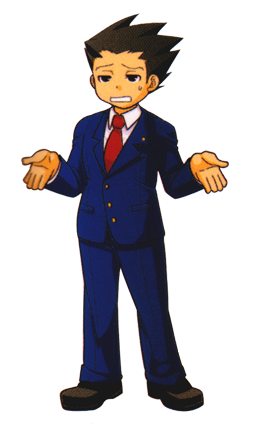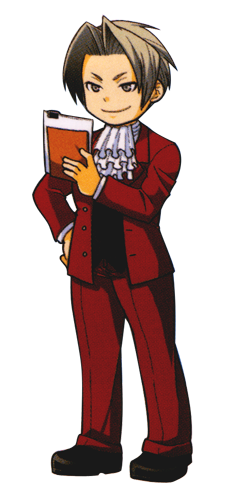Hi there again! Right now my blog's starting to highlight points that underline the blog title itself: Gamer at Heart!

Right now, aside from practicing to be an illusionist with the DS (and failing considerably, given the fact that the tricks require extreme practice to perform flawlessly), I've also taken up the role of a defense attorney and engage in a courtroom battle of wits - all courtesy of Phoenix Wright!

Phoenix Wright is a three-series game adapted from its Gameboy Advance version and now ported successfully to the Nintendo DS. You take on the role of the Defense attorney, Phoenix Wright, as he engages in a series of somewhat-related cases that unfold a major storyline of the game. The three series are Ace Attorney, Justice for All, and Trials and Tribulations. Some later cases with the latter two games will not directly involve Phoenix defending in court, but rather his companions and even rival would do it!
It's entirely a battle of wits, you having to perform an investigation at the crime scene and related places and also to converse with a number of witnesses, some actually testifying in court and some assisting on your investigation. In examining the locations, you obtain useful evidences and items that might aid you in proving your theories and/or charges in Court.

After an investigation, the trial itself begins, and you are introduced as the defense, your intellectual enemy being the prosecution. In most of the cases, Phoenix's rival is Miles Edgeworth, a High Prosecutor and well-known to win a lot of cases with a guilty verdict.
There's also the judge, of course, a man of wise judgment but can easily be swayed by points of both prosecution and defense. More often that not he agrees with prosecution unless the defense has something credible to present.
Courtroom battles here progress with lesser bureaucracy than what traditional courtrooms might have, given the absence of references to laws, rights, or any other judicial stuff that might pertain to the written law. All cases convened are murder and thus the duties are simply made clear for everyone to understand properly: the Prosecution is to exercise all means to prove the defendant guilty, be it by use of falsified evidences or testimonies; and the Defense is to protect his client by revealing flaws and exposing lies in the testimonies, or anything else that might appear as - as the game states - contradictory.
The Prosecution gets its way with witnesses, thus they are the ones presenting witnesses and sometimes, other evidence that you might have missed. Each witness gives one or more testimonies of what he/she saw at the crime scene and with each point of the testimony you are given the option to test its truthfulness by pressing her with the issue. The witness will reveal extra information but sometimes it won't be helpful, or it will be covered up by an objection of the prosecution.
Once a lie has been found, the defense can begin cross-examining. During a cross-examination, evidence is normally required to prove a lie in the witness's statement. As Miles Edgeworth himself says, "The only thing that belongs in a trial is evidence!". Therefore evidence is necessary! Present the right one and you nail the witness and the prosecutor. Present a wrong one, and the judge nails you!
From there on it's a series of testimonies, arguments, and cross-examinations. Phoenix's mentor, Mia Fey, has said that "Once you break through a witness's testimony, everything else falls apart." Therefore, once a lie has been exposed, it will be difficult to re-arrange one's testimony again. More often that not it leads him to expose more than what was necessary. Prosecution may object, but it will be too late.
In the end, everything culminates to a 'NOT GUILTY' verdict, but that is, if you have the brains to prove it!

No comments:
Post a Comment